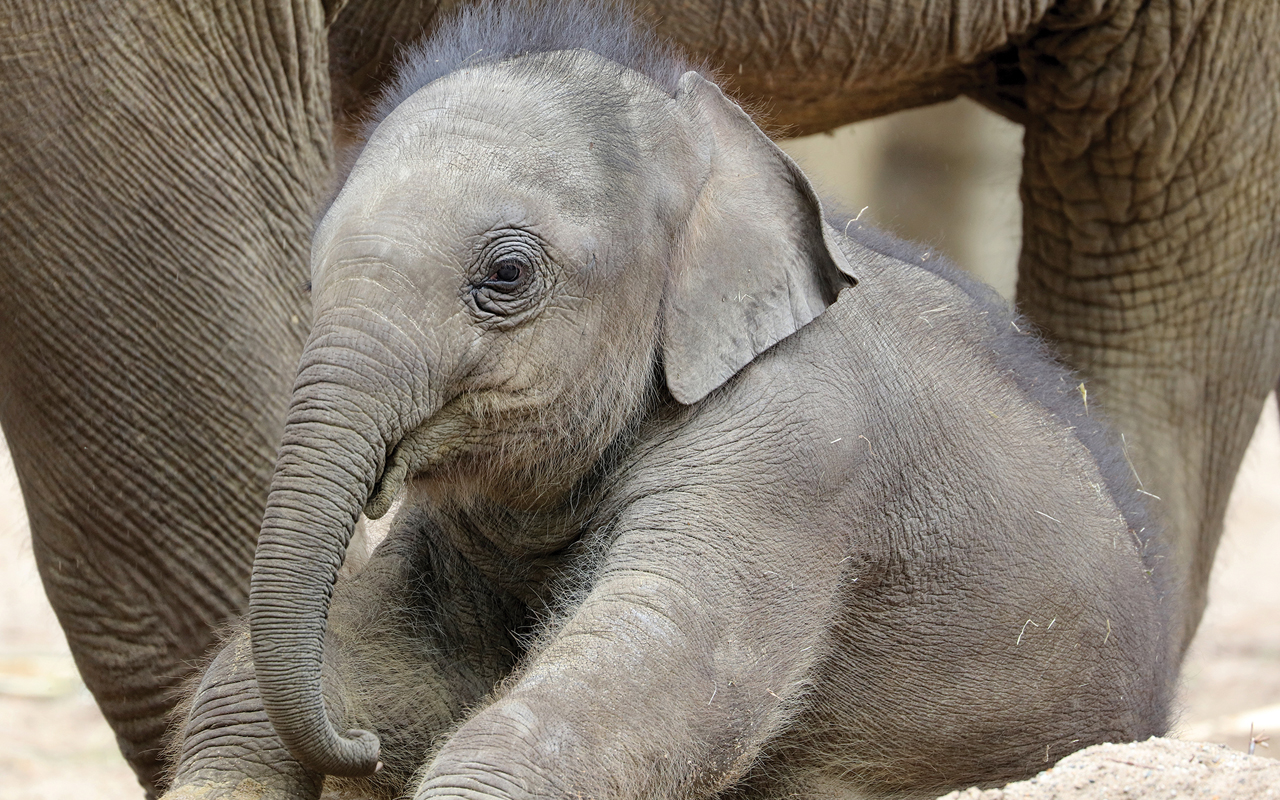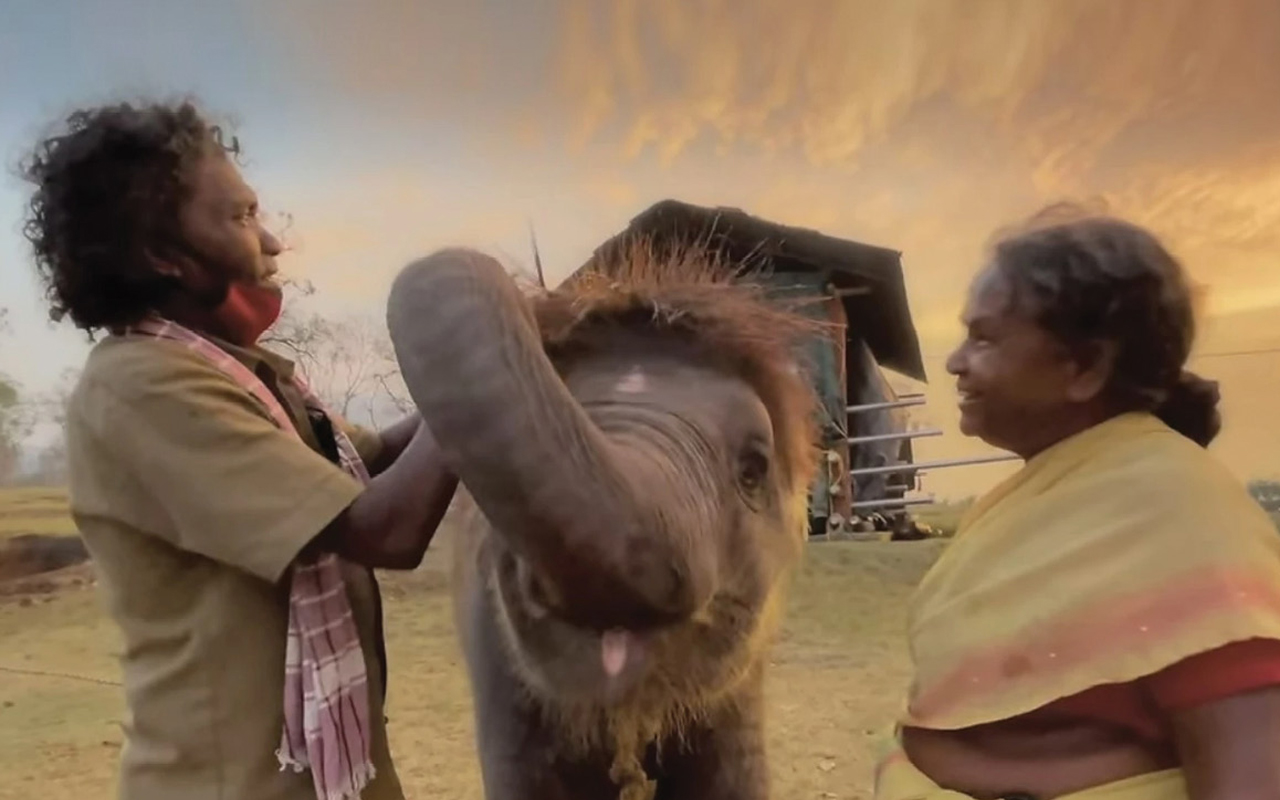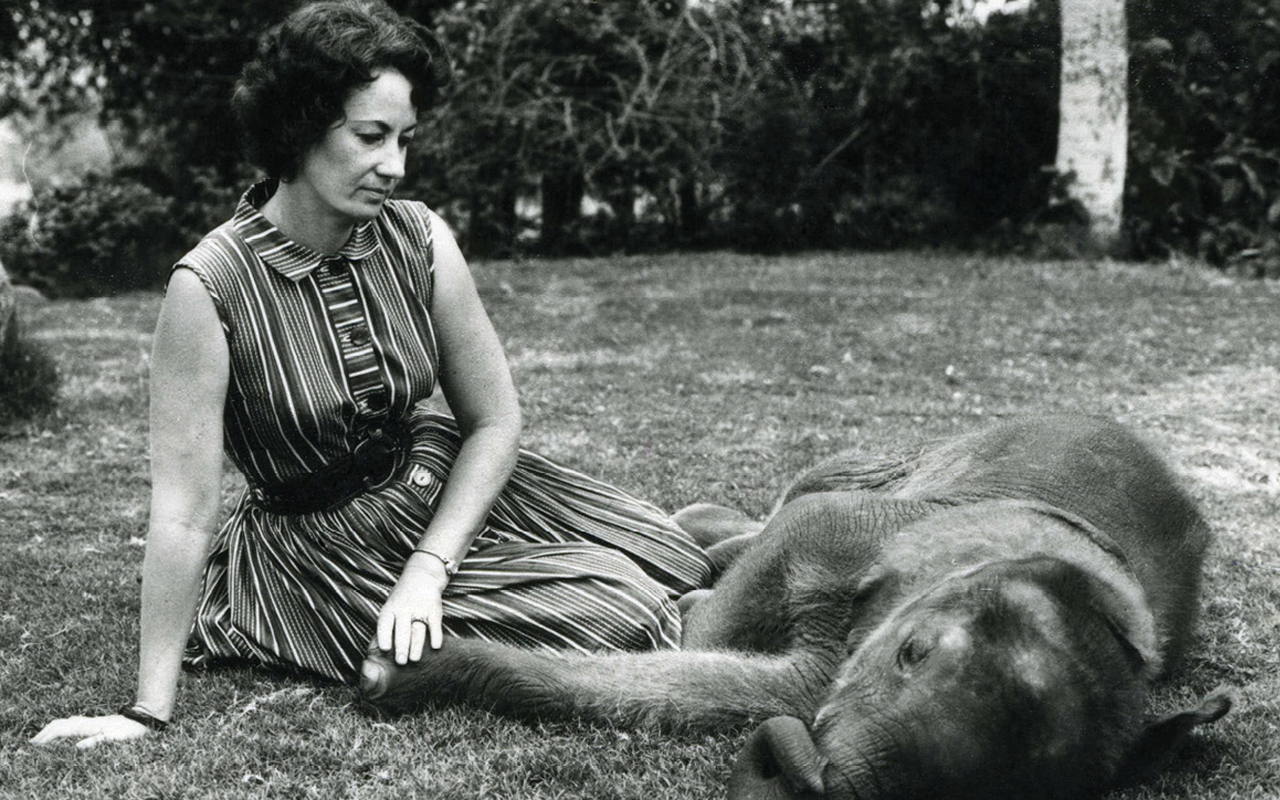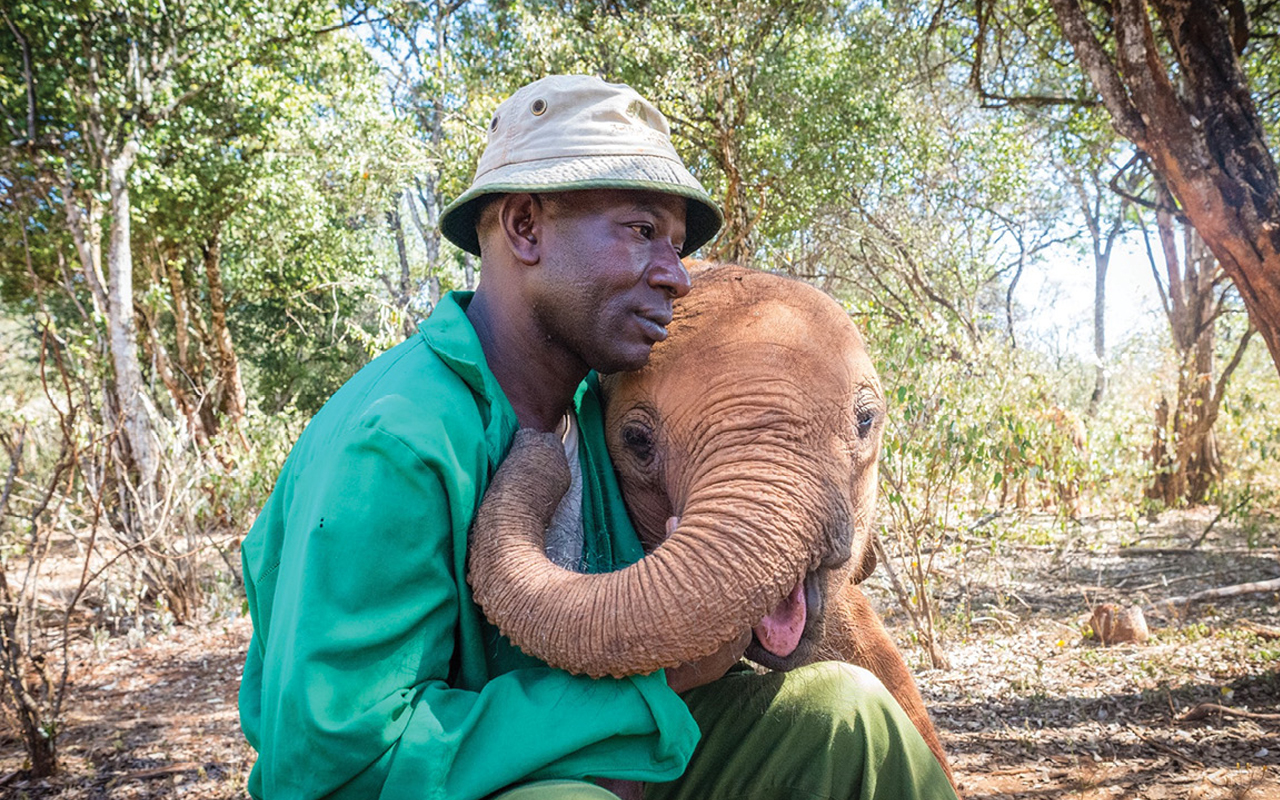
I have spent most of my life around African Elephants and can attest to the impact they continue to have on my heart. This year, Hollywood awarded an Oscar nomination in the ‘Best Documentary Short Film’ category to Elephant Whisperers – about a three-month-old orphaned Asian Elephant named Raghu whose mother was electrocuted at a fence next to an Indian village. The film’s Director, Kartiki Gonsalves, saw Raghu walking next to his human caretaker in 2017 as she drove past the Mudumalai Tiger Reserve in southern India. Orphaned baby elephants have almost zero chance of survival when they lose their mothers. Their trauma transcends past their physical needs. Elephants are sentient animals with profoundly deep emotions, and the grief that they suffer from the loss of their mother, will kill them. Gonsalves stopped to talk to the caretaker and ended up falling in love with the spirited baby Raghu. She spent the next five years following his life story, as well as that of his human “parents”, Bomman and Bellie.
“He was so young and extremely vulnerable,” explains Gonsalves, “and an inexplicably beautiful bond developed between Raghu and me.” Bellie’s maternal devotion to baby Raghu saved his life and the documentary gives us some compelling insight into the acute intelligence of elephants – as well as their immense similarities to humans – except that they are much better versions of us. They seldom ever display malice.
“When I first met the baby,” says Bellie, “he was tugging at my clothes like a child. I felt his love.” Beyond the physical work required to keep an orphaned baby elephant alive, Bomman and Bellie gave him the emotional care, love and affection that he would naturally have gained from his elephant family. All the elephants in natural herds display immense affection towards their babies who are surrounded by emotionally generous aunts, uncles, cousins, and siblings. Gonsalves concludes by saying, “I made this movie because I really wanted people to understand elephants, that they are very similar to us, and they don’t mean harm in any way.”
DAME DAPHNE SHELDRICK
One of the foremost world-renowned experts on elephants is the late, great Dr. Dame Daphne Sheldrick, who died in 2018 in her beloved Kenya, Africa. Today, her adult children run her Kenyan elephant and wildlife sanctuary named the Sheldrick Wildlife Trust. Their elephant orphanage has provided science with critical information on elephant intelligence and emotions. During her lifetime, Dame Daphne Sheldrick wrote a dissertation on ‘Elephant Emotions’.

Bomman and Belli with Raghu in Elephant Whisperers
ELEPHANT EMOTIONS
By Dr. Dame Daphne Sheldrick
Elephants possess the greatest human traits and almost none of the bad traits.
What happens to the babies? Like a human infant, an elephant baby cannot survive without the loving care of its mother. Orphaned African Elephants are succumbing in droves to starvation, grief and death. All the elephants that are under two years old when their mothers are killed will die unless they are rescued. Why is it that most people feel such empathy for elephants, even if they have never had close contact with them? Is it because of their size, their quaint characteristics, or the fact that they are so incredibly endearing as babies, tripping over little wobbly trunks that seem to serve no useful purpose other than get in the way? Or is it, perhaps, because elephants are “human” animals in terms of emotion, and in many other ways as well, encompassed by an invisible and mystical aura that reaches deep into the human soul in a mysterious way that defies human logic.
Elephants are highly intelligent and emotionally sentient creatures that experience many of the same emotions we do. They are known to grieve for their dead, to carry the tusks of dead family members to another place, to cover corpses with branches, to mourn deaths for a long time. They have been seen to weep tears of sorrow, the only other animal besides humans to do so. Baby elephants are forever traumatized by the horrific killings they have seen and the grief of losing their mother and herd.
With the killing frenzy that has overtaken them, their whole society is collapsing. All the older male bulls have already been killed for their tusks, leaving no father figures for the sons. Young, traumatized males often go on the rampage and attack human communities. Now, the ivory poachers are targeting the matriarch of the family (the eldest female member) – the core of the family group in whom resides all the wisdom, knowledge and experience that must be passed on to the young, such as where to look for water in times of drought, where to find food, how to look after their young. Poachers exploit the tight family bonds of elephants – they shoot a baby first, which causes the herd to gather around to protect it, and then they mow down the entire herd.
I can vouch for that, for I have worked intimately with elephants for 55 years. My team and I have hand-reared over 150 orphaned elephant babies to date, some from the day they were born. I have known them intimately through infancy and childhood into their teenage years – and even well beyond. For like us humans, some elephants like to stay in touch with those they love.
Every elephant we rear is returned back to the wild where it rightly belongs – to lead a normal elephant life back amongst its own kind, to cover vast distances in enormous elephant strides, enjoying the companionship of others, fulfilling all the tasks in life that elephants were designed to do such as modifying habitats to trigger wildlife’s cyclic and eternal rhythms between grasslands and scrublands essential to the long-term survival of grazing species as well as browsers.
During my long association with the orphaned elephants, many have chosen to remain in touch with the human family that replaced their lost elephant family, and whom they love as deeply as their elephant peers. Many have brought their wild-born babies to share them and their joy with their human family, and some have made sure that their babies are born right close to their former human family so that everyone can experience the joy of their arrival. Many have also returned to seek the help of their human family when wounded or sick. All our orphaned elephants return to a normal elephant life in the Tsavo National Park in Kenya, which is a protected area the size of Michigan State, and as such can offer an elephant the quality of life it deserves.

Dame Daphne Sheldrick with her orphans
Whilst it has not always been so, it is now accepted scientifically that elephants share with us many human traits. For instance, they have the same span of life, (three score years and ten, all being well) and that they develop at a parallel pace so that at any given age, a baby elephant duplicates a human of the same age. Their brain is four times the size of ours and convoluted, indicating that elephants can reason and think. It has also been proven that the part of an elephant brain responsible for memory is far more sophisticated than that of a human.They share with us a strong sense of family, and they also share with us a deep sense of death. I know that they grieve, and they mourn, just as we do at the loss of a loved one, and that they shed tears and suffer depression. They have a sense of compassion that projects beyond their own kind and can extend to other species in distress. They help one another in adversity, miss absent loved ones, and when you know them really well, you can see that they even smile when having fun and are happy.
Each elephant is a unique individual, just as are we, and each has its own unique personality. They can be happy or sad, placid by nature or more volatile. They can even be playfully mischievous, delighting in playing harmless pranks on other members of the family or herd. However, they are taught discipline from a very young age by their senior matriarchs. They know envy and jealousy, can throw tantrums and harbor grudges about a perceived injustice, just like human children. And just like human children, they can be competitive for rank and status amongst their peers.
This applies to both males and females, for elephant society is complex, where female family units remain united for life, led by the oldest female of the group who is known as the matriarch. Young bulls remain with the female family until puberty, but then prefer the company of other bulls so that they can spar with one another in tests of strength and dominance, often attaching themselves to high ranking and revered adult role models, whom they emulate, and learn from. However, they will always still keep in touch with their female family and visit them from time to time, but they are the scouts of elephant society, who must be more adventurous and seek out safe havens for their female loved ones. They prefer a more independent existence, for boys will be boys. That said, bull elephants are also very caring of the young.
Elephants are essentially peaceful and peace-loving animals despite their undisputed strength and enormous size. They are also essentially very fearful animals that are terrified of the unknown. Like human children, they are more fearful of the dark, for like us they have limited night vision.
But they have been endowed with many additional attributes that we humans lack such as the ability to communicate over distance using low range sound hidden to human ears.
They can decipher chemical, hormonal messages, and they have a mysterious perception that defies all human logic, able to foresee important events ahead of time.
We have witnessed this time and time again amongst our orphaned elephants.
Animals are more ancient, more complex, and in many ways more sophisticated than man. In terms of Nature, they are truly more perfect because they remain within the ordered scheme of Nature and live as Nature intended. They are different to us, honed by natural selection over millennia so they should not be patronized, but rather respected and revered. And of all the animals, perhaps the most respected and revered should be the Elephant, for not only is it the largest land mammal on earth, but also the most emotionally human.

Critical role of a caretaker at Sheldick Wildlife Trust ensures that baby elephants’ extensive needs are met – including emotional comfort
LAWRENCE ANTHONY
Author of The Elephant Whisperer
South African conservationist Lawrence Anthony devoted his life to animal conservancy, protecting the world’s endangered species. He nurtured a wildlife reserve in Zululand, South Africa, named Thula Thula game reserve.
In 1999, he received a life-changing call: a herd of seven elephants that were termed ‘rogue’ and ‘trouble-making’ had become notorious escape artists, and were barreling their way across sections of South Africa where they were not wanted. The background lives of these elephants explained a great deal. They had witnessed killings of their family members, and the post-traumatic stress was evident in their fight and flight behavioral patterns. These were not elephants at peace. They were permanently in a state of terror. Anthony’s knowledge of these facts made him hesitate when he was asked to accept this ‘rogue’ herd into Thula Thula. He was their last chance at survival. If he refused to rescue them, they would be killed. Recognizing the enormity of the task, and the emotional damage already inflicted on these giant animals, Anthony’s conscience superseded his logic. He was determined to give them another chance at life.
Upon agreeing to the rescue, before arrangements could even be made, the elephants broke out from their temporary enclosure, and the matriarch and her baby were shot. The surviving elephants in the herd were traumatized and very angry. After Anthony brought them to Thula Thula shortly afterwards, they started planning their escape. Their fight and flight mechanisms were at extreme reactionary stage, and running was what they knew best.
What followed was an incredible journey between Anthony and the herd as he battled to know and understand their behavior. It took years for him to gain their trust, but elephants are enormously sensitive, and even after a few months, they sensed something in Anthony which calmed them down. As he cautiously and respectfully gained their trust, he and they began to form an inexplicable bond. Anthony described that period as one of the greatest teaching lessons of his life in which he learned so much about these sympathetic creatures. As he engaged with the elephants’ signals, they taught him about life, loyalty, and freedom. The elephants adjusted to Thula Thula triumphantly and proliferated in numbers – always with the knowledge that their other adoptive family member – Anthony – was in close proximity as their friend and protector.
In March 2012 – something powerfully astounding occurred. Lawrence Anthony suffered a fatal heart attack on March 2nd. The elephant herd he had rescued, loved and nurtured were in the Zululand bush – a hundred miles away from Anthony’s house at Thula Thula. But these wild elephants made a solemn procession for 12 hours – in two separate herds – to come up to Anthony’s home to stand vigil around the house – grieving and paying their respects. The second herd arrived the day after the first herd arrived. They stood silently for two days around his bedroom, saying goodbye to the man who saved them. To this day, it is something that science cannot explain. How did they know that Anthony had died?
At Lawrence Anthony’s funeral, Rabbi Leila Gal Berner, said these words:
“A good man died suddenly, and from miles and miles away, two herds of elephants, sensing that they had lost a beloved human friend, moved in a solemn funeral procession to make a call on the bereaved family at the deceased man’s home. If there ever were a time, when we can truly sense the wondrous interconnectedness of all beings, it is when we reflect on the elephants of Thula Thula. A man’s heart stops, and hundreds of elephants’ hearts are grieving. This man’s oh-so-abundantly loving heart offered healing to these elephants, and now, they came to pay their respects to their friend.”
Elephants have long been known to mourn their dead in a profoundly deep way. In case any of you might be skeptical as to the relevance of this story, exactly one year after Anthony’s death, to the day, the same grieving herd marched to his house – again – to pay their respects.






